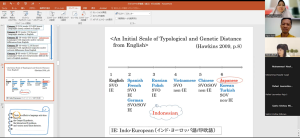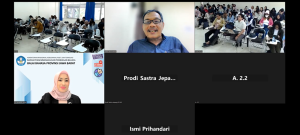The Bachelor program of Japanese Literature Faculty of Cultural Studies Universitas Brawijaya was first established as the Diploma I Japanese program in 2001. In 2002 it was then promoted into a Diploma III Program and in 2007 was elevated into bachelor program of Japanese Literature because of the tremendous enthusiasm from high school graduates and the opportunity to work at Japanese companies. The Japanese Literature program was continuously developing until it reached excellent accreditation from BAN-PT and AUNQA which is an international accreditation from ASEAN University Network of Quality Assurance.
One of the efforts to maintain accreditation status and to improve the quality of education and research as well as services to students is by organizing a 3 in 1 program. This program invites guest professors and practitioners to participate in teaching courses and providing knowledge for students. It is also expected that the teaching staff of the Study Programme of Japanese Literature could also reap the benefits to enhance the quality of research.
The implementation of the 3 in 1 program which started in 2019 has succeeded in bringing in experts in their respective scientific fields, such as linguistics and culture. This year, the Study Programme of Japanese Literature is again presenting a 3 in 1 program which focuses on the scientific field of linguistics, related to SLA topics. Our study program collaborated with Professor Imai Noriko who also serves as the Director of the Global Education and Advancement Support Center and lecturer at the Department of Humanities and Social Sciences, Kochi University. In addition, the practitioner involved in this 3in1 program is the Head of the West Java Provincial Language Center (Pusba Jabar) Bandung, Dr. Herawati, M.A.
The implementation of the 3 in 1 in the Study Programme of Japanese Literature program was carried out online on 9, 16 and 30 September 2023. The presentation of the material was started by the practitioner and was followed by Professor Imai Noriko for 2 consecutive meetings. On this occasion, students are free to ask questions and share experiences regarding the language acquisition process that they have undertaken together with practitioners, professors and their colleagues.


